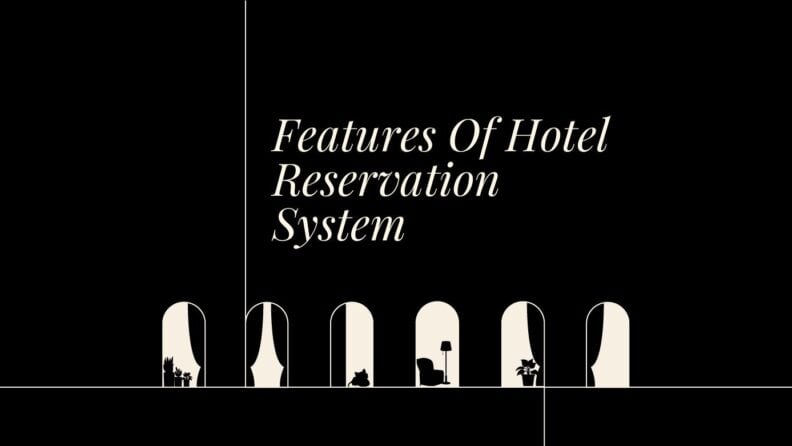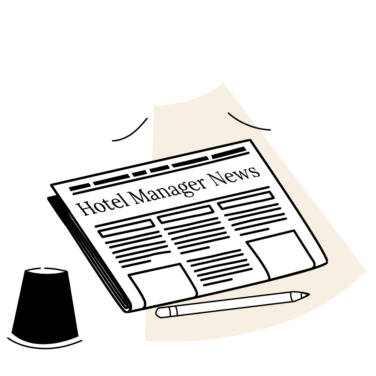Efficient hotel reservation software can prevent overbookings and streamline operations by checking room availability and managing bookings accurately, ensuring a seamless experience for both staff and guests.
Hotel software solutions facilitate quicker check-ins and check-outs with features designed to handle tasks efficiently, reducing time spent processing guests and enhancing overall satisfaction.
Stay organized and flexible with tools to manage cancellations effectively, avoid double bookings, and update room rates instantly, keeping your booking process smooth and reliable.
Generate insightful reports to analyze trends and optimize your hotel management strategies, using real-time updates to improve guest satisfaction and operational effectiveness.
Hotel booking tools streamline the process of payment handling, making transactions faster and more accurate, ultimately leading to fewer errors and happier guests.
Hey there! If you're exploring hotel reservation and booking software, you’re probably looking for features to make daily operations easier. Hotel reservation and booking software can be a game-changer for managing reservations, but with so many options, it can be tricky to pinpoint exactly what you need.
You need a solution that addresses specific challenges you and your team face every day. Maybe you're dealing with overbookings or trying to enhance guest satisfaction. Whatever it is, understanding the essential features of these tools can be key to finding the right fit for your hotel. Let's dive into the must-have features that can help you tackle those issues and make your booking process more efficient.
What Is Hotel Reservation and Booking Software?
Hotel reservation and booking software manages hotel reservations, ensuring that bookings are organized and tracked efficiently. It helps you and your team handle daily tasks like checking room availability, managing guest check-ins and check-outs, and processing payments faster and more accurately.
Hotel reservation systems work to make it easier to avoid double bookings, manage cancellations, and update room rates in real-time. You can also generate reports that analyze booking trends and improve customer satisfaction.
Overall, central reservation systems and a hotel booking engine adds significant value by simplifying the reservation process, allowing you to focus more on providing excellent guest experiences.
Top Hotel Reservation and Booking Software Features
When selecting a hotel reservation management system and hotel booking system, it is essential to understand the common and popular features that these systems offer. Familiarity with these features can help streamline the process of narrowing down the options and finding the right software to meet specific hotel management needs.
Online Booking Management
Online booking management in hotel reservation software is all about making life easier for you and your team. Its main function is automating and managing reservations through various online channels. This ensures that your availability is always updated without manually adjusting every time a new reservation is made. It's like having a personal assistant who never sleeps, ensuring that your room inventory is accurately reflected across all platforms, from your hotel’s website to third-party travel sites.
With this, you gain real-time insights into your online booking system, allowing you to make informed decisions about pricing and promotions. It also reduces the risk of overbooking, which can lead to unhappy guests and negative reviews.
When looking at online booking management features, consider sub-features like channel management, automated confirmation emails, and integrated payment processing. These functionalities enhance efficiency and improve guest experience by providing timely and accurate information about their bookings.
Channel Management
Channel management’s main function is distributing your room availability and rates to multiple channels like OTAs (Online Travel Agencies), GDS (Global Distribution Systems), and your hotel's website. It helps prevent overbooking and ensures your pricing strategies are consistent across all platforms. It automates the tedious task of updating room availability and pricing and drives more bookings by ensuring your hotel is visible to a wider audience, which is crucial in today's competitive market.
Consider features like automated updates, integration capabilities with your existing property management system, and real-time data syncing. These features ensure that your information is always current, reducing the risk of errors and maximizing your revenue potential.
Inventory Management
Inventory management is a key feature that helps you keep tabs on your room availability, pricing, and distribution across various channels. The main purpose of inventory management is to ensure that you have accurate, real-time information about your rooms, which helps make informed decisions about pricing and availability. It works by utilizing dynamic pricing models that adjust rates based on demand, historical trends, and upcoming events, so you can maximize revenue and occupancy rates.
When evaluating inventory management capabilities, look for sub-features like automated inventory controls and dynamic pricing. Also, consider how well the software integrates with various online travel agencies (OTAs) and how it supports different customer segments.
Payment Processing
Payment processing is a crucial component that ensures financial transactions are handled efficiently and securely. Its main function is facilitating guest payments, whether deposits, balances, or at check-in and check-out. This feature works by integrating with various payment gateways and processors, allowing you to choose the one that best fits your hotel's needs.
For hotel general managers, having a reliable payment processing system means less hassle with financial transactions. It supports automatic payments, which can significantly reduce the risk of human error and improve cash flow. Moreover, many systems now offer EMV terminal support, which enhances security and reduces fraud.
When considering payment processing features, look for those that allow for customizable payment options and support for multiple currencies if your hotel caters to international guests. Additionally, it should integrate with your existing booking engine or property management system for a smooth operation across all your hotel management tools.
Customer Relationship Management
Customer relationship management (CRM) plays a crucial role in enhancing guest interactions and experiences. By collecting and organizing guest data, CRM systems allow you to create personalized experiences, increasing guest satisfaction and loyalty. These systems help streamline communication, manage reservations efficiently, and tailor services to meet individual guest preferences.
A CRM system is valuable because it supports data-driven decision-making, boosts direct bookings, and automates operational tasks. You can expect features like contact management, sales automation, lead management, audience segmentation, and email integration. These effectively manage guest relationships and enhance service delivery.
When choosing a CRM for your hotel, look for sub-features like integration capabilities with other systems, strong reporting tools, and ease of use. It should centralize guest data management through integrations with property management systems (PMS). By leveraging a CRM, your team can foster stronger connections with guests and remain competitive in the hospitality market.
Mobile Accessibility
Mobile accessibility is about providing your team with the flexibility to manage tasks from anywhere. It lets you handle bookings, check room availability, and even communicate with guests from your smartphone or tablet. The main purpose is to ensure you and your staff can maintain operations without being tied to a desk. This is particularly beneficial for hotel general managers who need to oversee various aspects of the hotel while on the move.
Having mobile accessibility means you can respond to guest inquiries, manage reservations, and even adjust room rates in real-time. This feature helps maintain the flow of operations smoothly, even if you're not physically present at the hotel. Look for features like push notifications for reservation updates, mobile check-in options for guests, and integration with other hotel management systems.
Reporting and Analytics
Reporting and analytics features provide insights into various aspects of hotel operations. This helps you gather data on reservations, guest demographics, occupancy rates, revenue, and other key performance indicators. By analyzing this data, you can make informed decisions that enhance operational efficiency and improve guest satisfaction.
Reporting and analytics work by collecting data from different modules within the software, such as online booking engines and property management systems, and presenting it in user-friendly dashboards and reports. This allows you and your team to access and interpret critical information without extensive technical expertise.
You can also track trends, forecast demand, and identify areas for improvement. This helps in strategic planning and resource allocation. Additionally, some software offers sub-features like customizable reports, real-time data access, and integration with external data sources, which can be particularly valuable.
Integration Capabilities
A hotel reservation and booking software’s integration capabilities connect different systems and tools to work cohesively. This function allows your software to communicate with other platforms, such as customer relationship management (CRM) systems, point of sale (POS) systems, and online travel agencies (OTAs). By integrating these systems, you can ensure that data flows smoothly between them, reducing the need for manual entry and minimizing errors. For hotel general managers, this means having a unified view of operations, which can lead to better decision-making and improved guest experiences.
Integration capabilities allow you to sync reservations, guest preferences, and billing information across platforms, ensuring everyone on your team has access to the most up-to-date information. Look for sub-features like real-time data updates, which keep your team informed about changes as they happen, and open APIs for flexibility to connect with other tools you already use.
Multi-Language Support
Multi-language support helps your guests feel comfortable and understood, no matter where they’re from. It allows the software to display information and booking options in multiple languages, which is crucial for hotels that attract international guests. This feature ensures that language is never a barrier to booking a room, checking in, or accessing hotel services.
Having multi-language support means your team can cater to a broader audience without hiring multilingual staff for every language. It also reduces miscommunication and errors, leading to happier guests and better reviews. It's particularly valuable because it helps you tap into new markets and improve guest satisfaction.
Look for sub-features like automatic language detection, which adjusts the language based on the guest's location or browser settings, and customizable language options, allowing guests to choose their preferred language. These features enhance the guest experience by making interactions as smooth as possible.
Automated Notifications
Automated notifications keep you and your team informed about crucial updates and actions. These notifications can be set up to alert you about new bookings, cancellations, and even guest requests. They typically work by sending emails, in-app messages, or even Slack notifications, ensuring that you never miss important information.
This feature helps maintain smooth operations by keeping everyone in the loop. You can set notifications to alert different team members based on their roles, which ensures that the right person is informed at the right time. Additionally, automated notifications can aid in workflow approvals, such as confirming booking requests or notifying staff about room readiness.
When looking for automated notifications in your hotel software, consider whether it offers flexibility in choosing how and when you receive alerts. Some systems might even allow you to define specific triggers for notifications, adding another layer of customization. This enhances operational efficiency and improves communication across your team.
How to Choose a Hotel Reservation and Booking Software
When shopping for hotel reservation and booking software, it's easy to get swept up in analysis paralysis. Does it have the right features? The right integrations? Can you customize it? Is it user-friendly?
Breathe. You've got this. Use this handy pre-purchase checklist for your evaluation and selection process to find the perfect hotel reservation and booking software for your needs.
Hotel Reservation and Booking Software Buyer's Checklist
| Criteria | How to Evaluate |
|---|---|
| Scalability | Can the software grow with your hotel's needs? |
| Integrations | Does it integrate with your existing systems? |
| Value for Money | Does the cost align with the features provided? |
| Customizability | Can you tailor the software to fit your hotel's operations? |
| Industry-Specific Features | Does it offer features unique to your hotel's niche? |
| Ease of Use | Is the software user-friendly for your staff? |
| Security Safeguards | Does it provide adequate protection for guest data? |
| Mobile Accessibility | Can you access the system from mobile devices? |
| Customer Support | Is there reliable support available when needed? |
| Reporting Capabilities | Does it offer comprehensive reporting tools? |
10 Top 10 Hotel Reservation and Booking Software
Here are our top picks of the best hotel reservation and booking software to help you in your search:
Leveraging Automation in Hotel Booking Management
Managing hotel reservations can be complex, especially when dealing with a high volume of bookings. One way to ease the burden is by leveraging automation features found in modern booking management tools. Automation saves time and reduces the chances of human error, ensuring a smoother operation.
- Automated Approval Workflows: When a booking is made, the system automatically notifies the designated approvers, who can approve or reject the booking directly from their dashboard. This eliminates the need for manual follow-ups and ensures that all bookings are reviewed promptly.
- Smart Scheduling: Smart scheduling features allow you to apply dynamic filters. For instance, you can easily identify which resources are underallocated during specific periods. This helps optimize resource utilization and ensure that no team member is overburdened or underutilized.
- Dynamic Grouping: With smart group features, you can create dynamic groups of users based on specific criteria such as availability, location, or skills. This makes it easier to manage teams and allocate tasks based on current needs and availability.
By integrating these automation features into your booking management process, you can enhance efficiency and focus more on delivering exceptional guest experiences. Tools that offer automated workflows and smart scheduling can be a game-changer in managing reservations effectively.
Hotel Reservation System FAQs
Here are some questions people also ask me about hotel reservation systems or hotel booking processes more generally.
How can hotel software help hoteliers make more money?
Hotel reservation software helps hoteliers and hotel owners manage room types, streamline front desk tasks, and boost profitability. It integrates with the hotel industry and hospitality industry systems, making it ideal for small hotel operations. Tools like revenue management also adjust rates to maximize earnings.
What features should hotel software have?
Look for cloud-based systems with a mobile app, an all-in-one dashboard, and a user-friendly interface. These features improve access, simplify training, and help staff manage bookings efficiently.
How do hotel booking systems handle payments?
Booking platforms enhance the booking experience with online reservation, online payment, and secure payment tools. They support multiple booking channels and distribution channels, and let guests buy add-ons like upgrades during checkout.
How does hotel software improve guest experience?
Software uses guest information to personalize stays and improve user experience. Social media integration supports engagement, feedback, and promotions to strengthen guest relationships.
Want More Content About Hotel Reservations and Booking Management Tools and Tips?
Elevate your professional edge in hospitality & hotel management - subscribe to our newsletter for a curated blend of expert advice, industry news, and success secrets!



